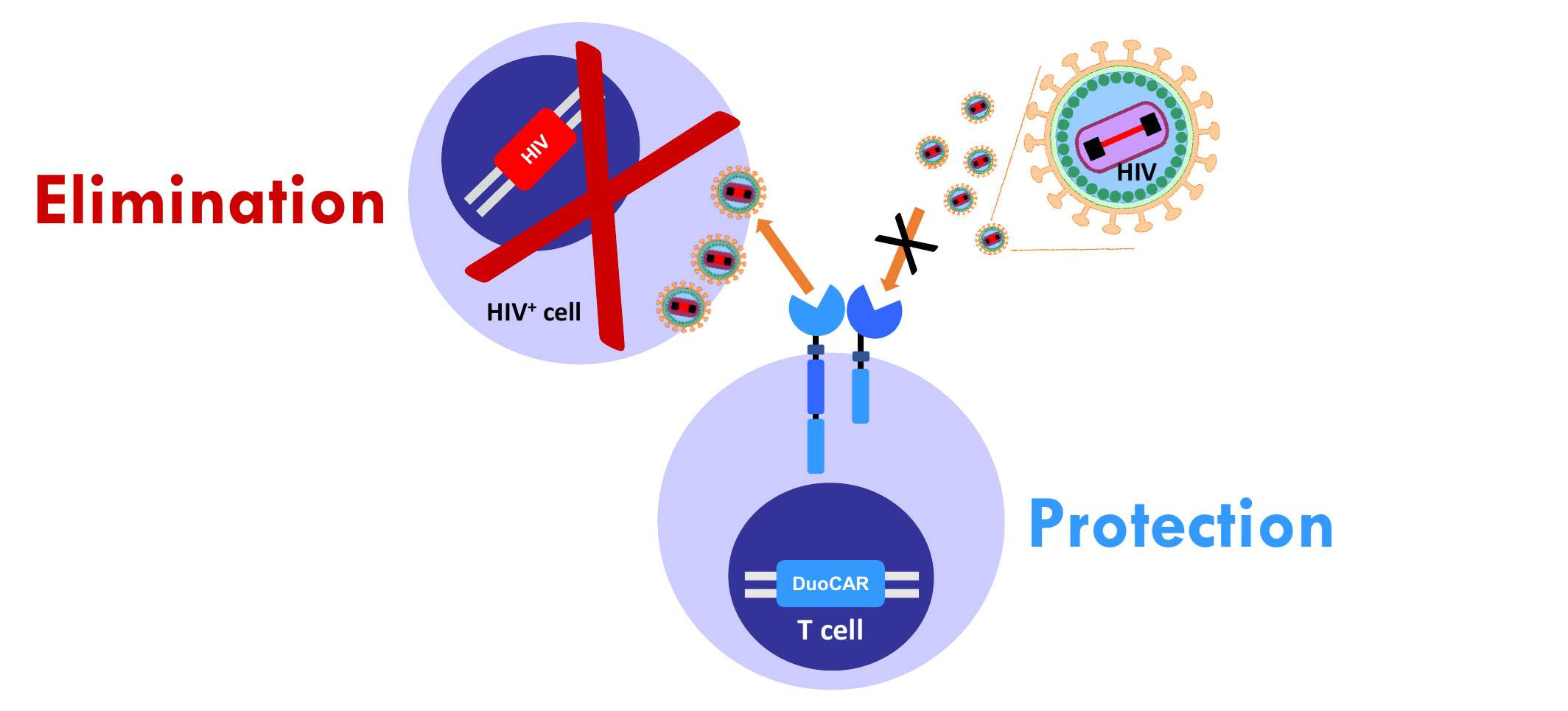The goal of this program is to develop a one-time curative therapy for HIV-1 infection, the virus that causes AIDS if left unchecked without drug therapy. Leveraging our knowledge of successful CAR-T cell therapy for the treatment of Leukemia and Lymphoma, we have now developed anti-HIV CAR-T cells that are targeted to kill HIV infected cells and protect CD4 T cells from HIV infection.
Anti-HIV CAR-T cells: an animated introduction
Why We Need a Cure
There are currently 38 million people around the world living with HIV, with between 1.7 to 2 million new cases of HIV reported every year.
The current standard of care is antiretroviral drug therapy (ART) which successfully suppresses virus replication and improves the life span of HIV-infected individuals.
However, ART is not a cure for HIV since it only suppresses the virus and thus, requires life-long adherence to drug treatment. Besides treatment failure due to non-adherence, other challenges using ART include poor drug tolerance, development of drug resistance, affordability, and lack of access.
About 47% of the people living with HIV globally are unable to achieve virus suppression due to ART-related toxicities, drug resistance, or lack of access to treatment.
A curative therapy could provide lifesaving treatment for such people and potentially curb the HIV epidemic in places where viral suppression is not achieved.
Even for individuals who are able to achieve durable virus suppression on ART, a curative therapy would significantly improve their quality of life by reducing co-morbidities and making lifelong adherence to drug therapy unnecessary.
Studies to Date
We’ve developed anti-HIV duoCAR-T cells that have been shown to potently suppress HIV and eliminate actively HIV-infected cells.
Our pre-clinical studies with anti-HIV duoCAR-T cells have shown:
- Almost complete inhibition (>96% inhibition) of HIV replication when tested against broad HIV-1 strains found around the world.
- Elimination of actively HIV-infected cells in animal models after infusion of anti-HIV duoCAR-T cells.
- Protection of CD4+ T cells from HIV infection in animal models after a single infusion of anti-HIV duoCAR-T cells. Loss of CD4+ T cells eventually results in AIDS if left untreated.
The above findings are the first to show such effects in an animal model after a single treatment.

Clincal Studies
A phase I/IIa clinical trial for anti-HIV CAR-T cell therapy is in progress at the University of California, San Francisco and at the University of California, Davis. More details of the trial can be found at clinicaltrials.gov with the identifier NCT04648046.
References:
Anthony-Gonda, K., Bardhi, A., Ray, A., Flerin, N., Li, M., Chen, W., Ochsenbauer, C., Kappes, J., Krueger, W., Worden, A., Schneider, D., Zhu, Z., Orentas, R., Dimitrov, D.S., Goldstein, H., Dropulić, B. Multi-specific anti-HIV duoCAR-T cells display broad in vitro antiviral activity and potent in vivo elimination of HIV-infected cells in a humanized mouse model. Sci. Transl. Med. 2019 Aug; 11: 1-16/eaav5685
https://stm.sciencemag.org/content/11/504/eaav5685
https://www.ncbi.nlm.nih.gov/pmc/articles/PMC7136029/
Anthony-Gonda K, Ray A, Su H, et al. In vivo killing of primary HIV-infected cells by peripheral-injected early memory-enriched anti-HIV duoCAR T cells. JCI Insight. 2022;7(21):e161698. Published 2022 Nov 8. doi:10.1172/jci.insight.161698
https://www.ncbi.nlm.nih.gov/pmc/articles/PMC9675454/
